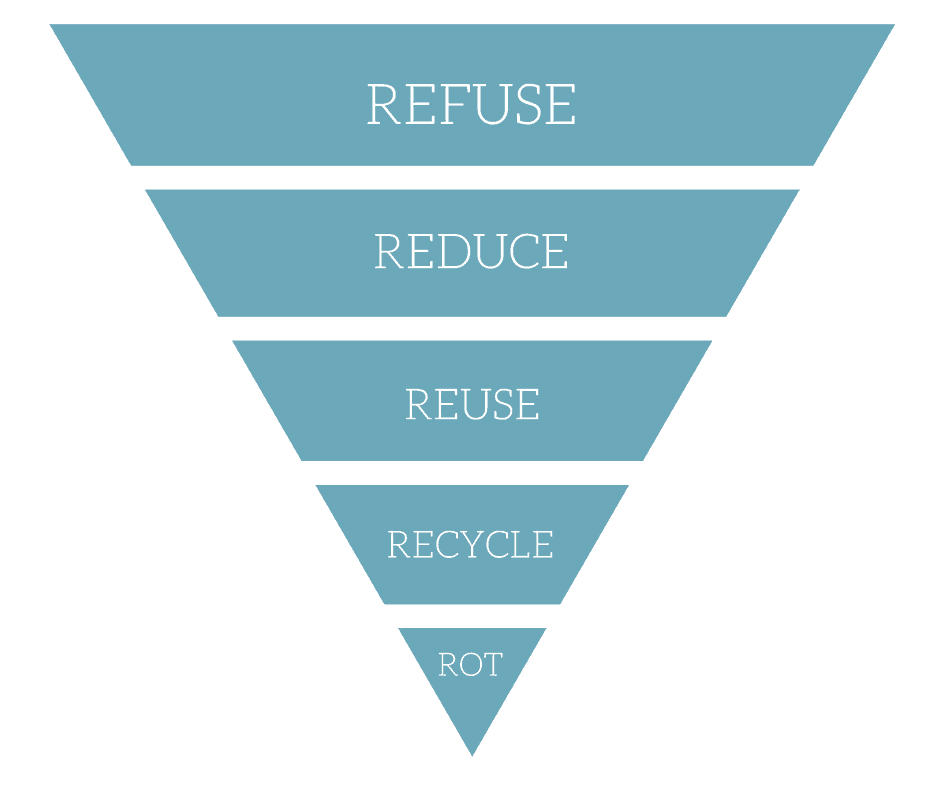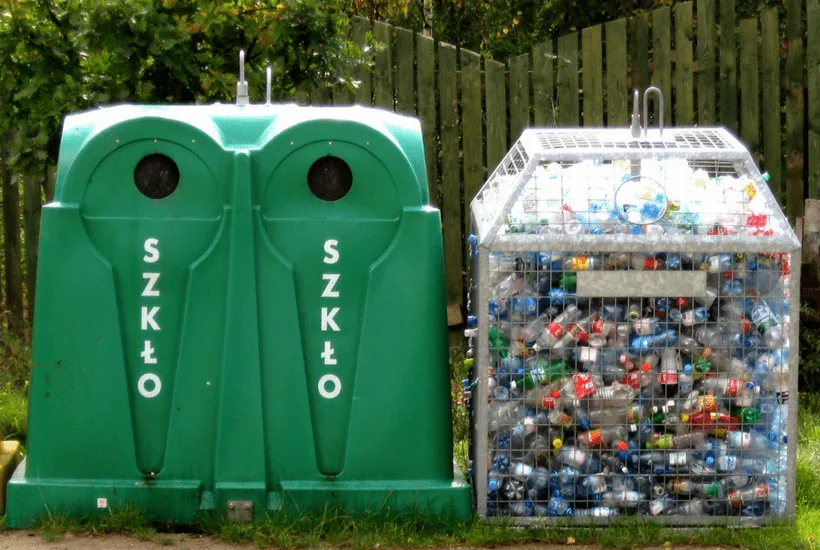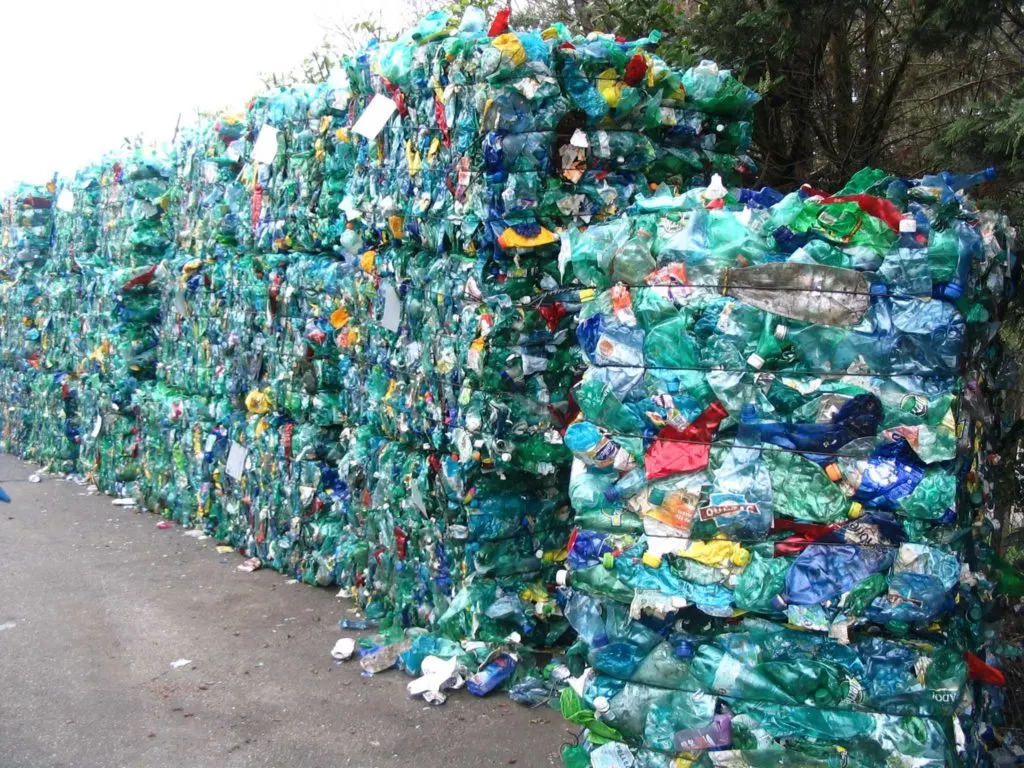Since going zero waste, many people have asked me: Why do I need to go zero waste when we can recycle instead? Theoretically, if recycling were a perfect, circular system (i.e. a system that allowed us to re-make things forever and ever without any waste byproduct) they would be right. Unfortunately that’s not the case.
The Status Quo: A Linear Approach
There is a fundamental flaw in our current manufacturing process: our production system only goes one direction – from earth to dump. So, while recycling has some benefits, it doesn’t solve the problem completely.
Here’s what that looks like today:
- Raw resources like trees, petroleum, and precious metals are extracted from the earth.
- Manufacturing turns those raw materials into products, often through polluting processes.
- A distributor ships those products very long distances to sell it to you, the customer.
- You get bored with the product, or the product breaks, so you throw it away.
- Someone picks it up and either attempts to destroy it or hide it in the ground where you won’t see it anymore.
Not amazing.
This production process is extremely short-sighted, meaning it focuses more on short-term gain and short-term profit than long term sustainability.
For a lot of corporations, the health of the earth is of little concern if you can make a buck.
Now I know that might sound reductive, but it’s true; and it’s the cause of some of our most pressing concerns today including: climate change, unethical labor standards, population health, and resource wars over precious things like fresh water.
The Ideal: A Circular Approach
A zero waste system, on the other hand, is a cyclical one like nature, and it does two very important things:
- It redesigns our system of resource use and production to prevent waste and pollution, and
- It captures any discarded things and uses them fully.
Today we’re stuck with something in between. In the hierarchy of zero waste, recycling should really be your second-to-last resort. The reason for this being: there is so much you can do to avoid needing to recycle in the first place. Isn’t it better to avoid the process altogether, if you can?
Here’s what the zero waste hierarchy should look like.
The more closely you follow this hierarchy, the less waste you will produce. What is leftover will only be the smallest amounts. Many zero waste bloggers have already proven the concept, fitting years’ worth of garbage into a single mason jar.
However, it takes a while to get to this place. I’m absolutely still working towards absolute zero waste.
How to Recycle Correctly
One of the primary reasons that recycling plants are unable to make the most out of what we send to them can be chocked up to human laziness.
So, while the amount of recyclables being sent to recycling facilities has gone up in recent years, the amount of materials actually being recycled has remained steady. I think we can do better. Here’s how.
1) Find out if you have city recycling.
If you live in a city of any real size you should have recycling, at least at a base level. Look up your solid waste authority and get the full scoop on their process. When we first moved to our current home, our recycling cart didn’t get picked up for more than a month because we didn’t know it had to be taken to a specific spot on the curb. Get to know their process!
Make sure you know:
- What gets recycled
- When pickup happens
- How carts must be placed
2) Get to know the rules.
Every municipal recycling entity should have specific details on their recycling program. Every city’s rules are different! You should be able to find the information you need on your city’s website; if you can’t locate it, get in contact with someone who can send you details directly.
Make sure you know:
- Which items may be placed in containers
- What items may not be placed in containers
- If only certain types of plastics or papers are allowed
- Whether or not items must be fully washed and cleansed
- If recylables must be separated by type or if single-stream is allowed
Don’t make recycling crew workers sort through it for you.
3) Follow those rules because it matters.
Pre-Zero Waste, there were many times that I simply tossed a soiled can into the trash, rather than recycle it, because I was too lazy to wash out the can. You can yell at me. A good recycling program is the responsibility of city agencies as well as individuals.
So, do the work, or cut recycling out completely!
4) Make recycling as easy as possible.
Place your in-home recycle bins somewhere where you will use them. Make your system easy, accessible, and nice-looking so you don’t tuck it away out of sight. Here is a Pinterest board full of inspiration!
5) Work hard to eliminate the need to recycle altogether.
If we all work towards a more sustainable future, the need to recycle at all will reduce significantly. Something to get on board with!
Sound doable? Comment below with your thoughts!




